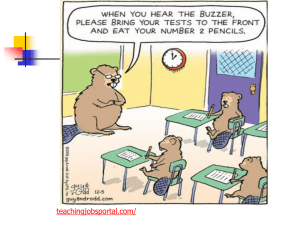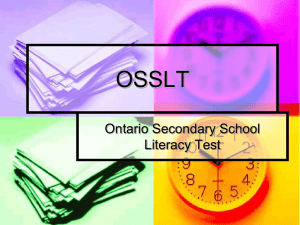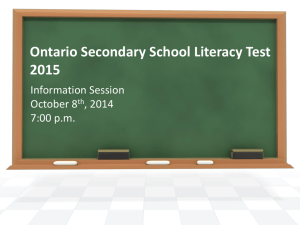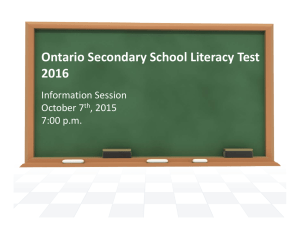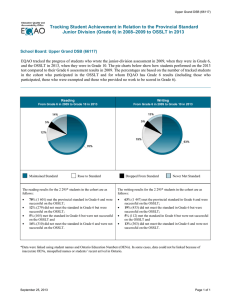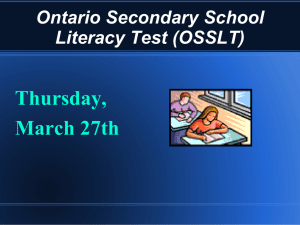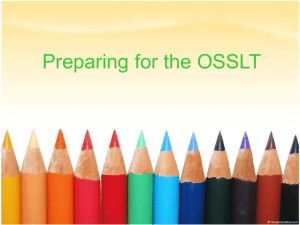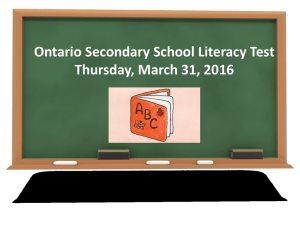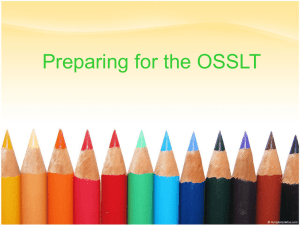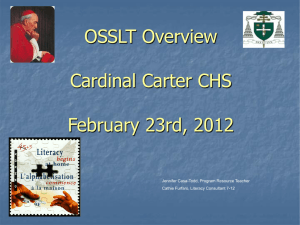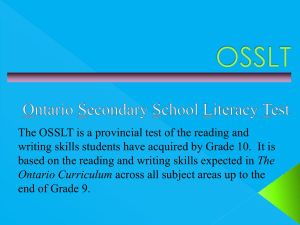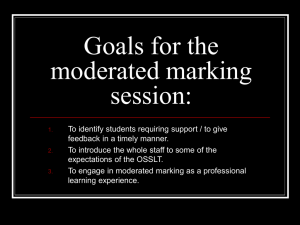OSSLT Information Presentation - Adam Scott CVI & Intermediate
advertisement
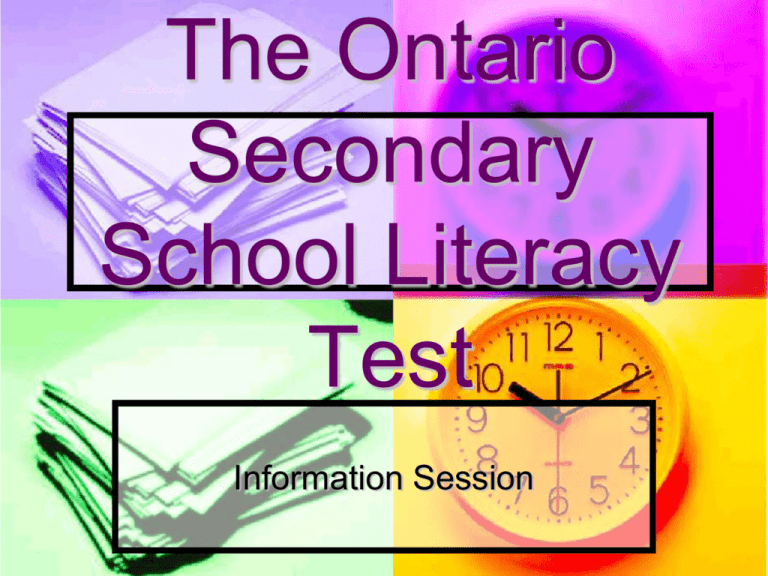
The Ontario Secondary School Literacy Test Information Session COMMON QUESTIONS What is the OSSLT? The grade 10 Literacy Test is a provincial test of the reading and writing skills students have acquired by the end of grade nine. It is based on The Ontario Curriculum across all subject areas up to the end of Grade 9. Do you have to write the OSSLT? YES, if you entered secondary school any time after 2000 YES, if you are in grade 10 this year YES, if you are intending to graduate with an OSSD Does the OSSLT count towards course marks? NO. Successful completion of the OSSLT is one of the 32 requirements for the OSSD. The test will not count toward your course marks. Will Universities and Colleges see my OSSLT results? Your secondary school transcript will indicate that you have completed the OSSLT as one of the 32 requirements for the OSSD. Is the OSSLT difficult to pass? The OSSLT is based on the reading and writing skills that you have learned up until the end of Grade 9. The test is out of 400; you need a score of 300 or more to pass. If I do not succeed, can I take the OSSLT again? YES. If you do not succeed, you can try the OSSLT again next year. Or, you are eligible to take the Ontario Secondary School Literacy Course in summer school or next year. What happens? 9:00-10:20 Test Instructions and Completion of first test booklet (reading and writing) 10:20-10:30-Break (snack will be provided) 10:30-11:45-Completion of second test booklet (reading and writing) and student questionnaire Where do you write? Students will be writing in the cafeteria, library, and room 207 Check for your name on the lists outside the main office If you DO NOT SEE your name, find me in 207 asap SOME DETAILS… OSSLT April 11, 2013 The test will be one morning long – broken up into two 75 minute sessions. Each student will complete two test booklets. Each student will receive ONE Literacy Result. Everything you write is considered part of your writing performance. When you write answers for reading tasks you are marked for both your reading and writing ability. Points to Remember… Do NOT write point form answers. Answer all questions in complete sentences. Remember to use correct spelling, grammar and punctuation (to the best of your ability). It is a guarantee that the literacy test will have the following: Reading: Informational Narrative Graphic Dialogue News Report 31 multiple choice 4 open response questions Writing: News Report Series of Paragraphs supporting an opinion 2 Short writing tasks 8 Multiple Choice The Reading Selections Specific Reading Skills are Assessed: Understanding directly stated ideas and information (literal meaning) Understanding indirectly stated ideas and information (inferences) Making connections between the passages and personal knowledge and experience (interpretation) Examples: Directly Stated Information: Indirectly stated information: What did Sam do after he left the radio station? The answer can be found in the text. Why did Sam leave the radio station before the end of his shift? You must use your own knowledge and the information in the text to answer. Examples: Making Connections: Describe a time when you had to make a difficult decision. Compare your experience to Sam’s using specific examples from the text. NOTE: Many students provide an answer; however, they do not often use the necessary examples. Multiple Choice Multiple Choice often seems easy and quick; however, these questions are quite challenging and require careful thought. Multiple Choice “points” add up, so it is good to practice before the test. Example: • A) B) C) D) What is Adam Scott? A high school A football team A local organization The name of a high school in Peterborough • More than one correct answer will be presented • It is important for each student to take the time to find the most correct answer • D) The name of a high school in Peterborough The Writing Tasks Long Writing Tasks: News Report (1 page) Series of Paragraphs Expressing an Opinion (2 pages) Short Writing Tasks (six lines each – paragraph skills) Multiple Choice Questions: Organization of Ideas Sentence and Paragraph Structure Language Conventions (use of capitalizations and punctuation) Rough Work: PLAN out your writing. Many students skip this stage and it shows in their work. Shorter, well-organized writing responses are better than long, disorganized ones. Specific Skills Assessed… Focus on a main idea (the main topic) Provide supporting details (develop the topic) Organize and link ideas (sort them and sequence them into a logical order) Use appropriate tone (think of the stated audience) Correct: grammar spelling punctuation A Helpful Hint: Read instructions! Many students do not read the instructions. Example: Write a Series of Paragraphs Expressing an Opinion (a minimum of three)… Preparation Strategies: Getting Ready Guide This guide contains tips and information to help students prepare for the OSSLT. Resources: Planning and Preparation Guide This guide shows sample questions from the OSSLT. Resources: Example Test Booklets These booklets look like the test and give you an idea of the amount of work you will be asked to do in the hour and fifteen minute session. The Website… www.eqao.com Check out the website to practice. Print out a practice test and try it at home. Make use of the tips and strategies listed in the Getting Ready Guide. VERY IMPORTANT Be on Time! If you are less than an hour late: Your parents/guardians will be called Instructions are not repeated You will write the test in the office If you are more than an hour late: You will need to meet with the Principal immediately BRING: Blue or black pens Highlighter Pre-sharpened pencils Erasers Book or magazine to read DON’T BRING: Gym bags Backpacks Lunch bags ANY ELECTRONIC DEVICES (cell phones, ipods, etc. will be confiscated; your test may be in jeopardy) REMEMBER: LUNCH HOUR LITERACY TEST SUPPORT Wednesdays Room 207 MORE QUESTIONS?
